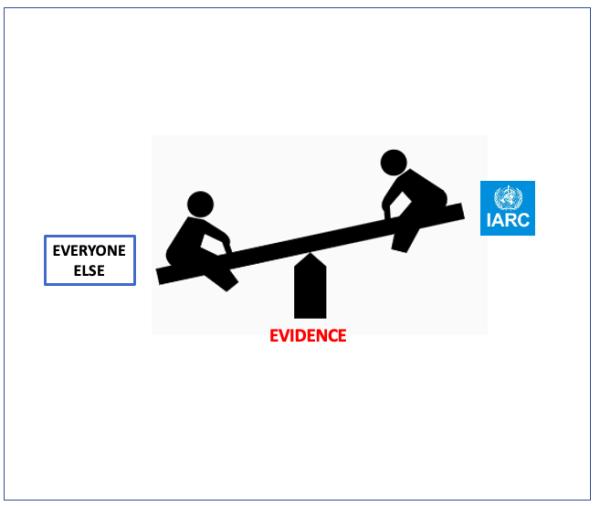New York City Council Member Ben Kallos sure knows how to play the game. In his quest to get glyphosate (Roundup) banned from parks and other public spaces, he uses a tried and true method. Simply include the words "children" and "cancer" in the same sentence and bang - news coverage. Say what you will about Kallos' scientific acuity, but you have to hand it to him – he does scare with a flair:
“I’ll take weeds all day long over cancer. I don't know why this is such a big problem.”
Ben Kallos, New York City Council Member
Personally I don't know of anyone who would prefer cancer to weeds, so in a sense Kallos and I are in agreement. But the glyphosate = cancer claim? Not so much. And he has help in his anti-pesticide quest from NY1 (1) reporter Ari Ephraim Feldman, who recently wrote a magnificently slanted article titled "City May Soon Ban Chemical Pesticides Like Roundup."
Slanted? For starters, if you skim the article, you run right into this;

Whoa! Feldman writes that according to a 2016 report by the city's Department of Health and Mental Hygiene, the World Health Organization "considers glyphosate a probable human carcinogen." This is incorrect. The WHO states that glyphosate is "unlikely to cause cancer at realistic exposure levels." More on this later.
As if to show how balanced his article is Feldman concedes that the EPA does not consider the chemical to be carcinogenic...
But...
... he also implies that perhaps we should ignore the EPA's opinion because of an article in the occasionally reliable Huffpost written by the less-than-occasionally reliable Carey Gilliam of the never-ever reliable US Right to Know group. Not surprisingly, Gilliam suggests that some twisted conspiracy/cover-up was involved in the EPA's "obviously tainted" conclusion.
Readers who stop at this point will "know" that the WHO calls the chemical a carcinogen and the EPA says the opposite, probably due to financial incentives. So which organization is a person to believe? The choice seems obvious. In the absence of any other information, it's a pretty sure bet that readers will believe the WHO and dismiss the "corrupt" EPA.
Problems and More Problems
It's all wrong.
For starters, the WHO (as I mentioned above) does not consider glyphosate to be carcinogenic, but its own sub-agency, the International Agency for Research on Cancer (IARC), does. Both of these can be true as you will see.
Also omitted in the article are the many other worldwide agencies that have weighed in. None of the following agencies or organizations (2) consider glyphosate to be carcinogenic:
- National Toxicology Program (US)
- EPA (US)
- Health Canada
- European Chemicals Agency
- French Agency for Food, Environmental and Occupational Health & Safety
- German Federal Institute for Risk Assessment
- Australian Pesticides and Veterinary Medicine Authority
- Federal Food Safety and Veterinary Office (Switzerland)
- Environmental Protection Authority (New Zealand)
- National Health Surveillance Agency (Brazil)
- Food Safety Commissions of Japan
- Rural Development Association (S. Korea)
What's going on? First, Feldman either failed to do his homework or intentionally mislead his readers. Second, both of the opinions of the IARC and the WHO (its parent agency) could be correct. Here's why: IARC measures hazard, not risk. Hazard is a measure of whether a given chemical could cause condition X under any circumstances, at any exposure or dose, realistic or not. It is an inferior method for measuring toxicity because it gives answers based on assumptions that people will be exposed to the same high doses of a chemical as lab animals.
The WHO (and all those other agencies) have determined that using risk (the hazard based on the likely exposure that humans will actually encounter) is the superior method to determine the actual cancer-causing potential of glyphosate. Using risk as the determinant, glyphosate is not a carcinogen. But IARC has determined that the chemical can cause cancer under conditions that are completely unrealistic and unlikely, except maybe when shoveled into lab animals.
But this is one more interesting factoid to consider. IARC itself may be corrupt, something that was explored in detail by my colleague Alex Berezow (See: Glyphosate-Gate: IARC's Scientific Fraud).
Bottom Line
Both The New York City Council and NY1 are either misinformed or dishonest, but hey - if that's what it takes to make (up) a good story what the hell? Weeds spread like weeds (3). So do scares.
NOTES:
(1) NY1 is a popular source of local news in New York.
(2) Credit for this list goes to the Genetic Literacy Project.
(3) I'm not concerned about either glyphosate or weeds. In fact, when I used to play in Central Park in the 70s, it was sure a lot easier to find weeds than grass. Besides, the weeds protected us from all the broken glass.
# ACSH has a long history of weighing in on the health risks (or lack thereof) of glyphosate. Following is a selection of key articles and publications.
-
Who's Afraid Of Roundup? (Dr. Geoffrey Kabat)
- EPA Refutes Study Claiming Glyphosate Boosts Cancer Risk (Dr. Geoffrey Kabat)
-
IARC Activism Begins To Unravel - Congress May Be About To Pull Their Plug
-
A $289M Hit Job On Science In Jackpot Verdict On Monsanto's Glyphosate
-
Activist-Legal Complex Will Destroy American Science And Industry
- Infographic: Global Regulatory, Health Research Agencies On Whether Glyphosate Causes Cancer




